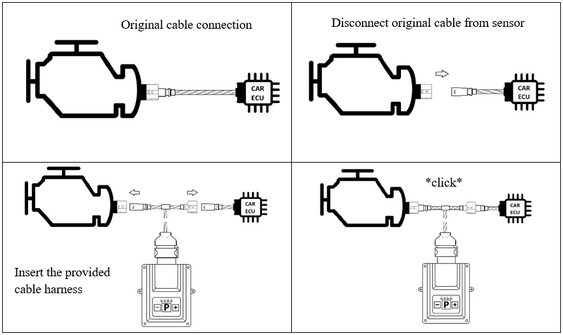Engine tuning increases horsepower by optimizing the air-fuel mixture and ignition timing, allowing the engine to produce more power from the same amount of fuel. As a result, the engine operates more efficiently and effectively, resulting in improved performance and increased horsepower output.
Engine tuning involves adjusting various parameters such as fuel delivery, air intake, and exhaust systems to enhance the engine’s power output. By fine-tuning these components, engine tuners can maximize the engine’s potential and overall performance. Additionally, modifications can be made to the engine’s computer system to further enhance horsepower and torque.
Overall, engine tuning is a crucial aspect of maximizing a vehicle’s performance and achieving higher horsepower levels.
The Basics Of Engine Tuning
When it comes to boosting the speed and performance of a car, engine tuning plays a crucial role. Understanding the basics of engine tuning and how it increases horsepower is essential for any automotive enthusiast.
Introduction To Engine Tuning
Engine tuning involves optimizing the performance of an engine by adjusting its various components and parameters. By fine-tuning these elements, the engine’s power output can be significantly increased. Whether it’s modifying the fuel system, ignition timing, or air intake, the goal is to enhance the engine’s efficiency and overall power.
How Engine Tuning Works
Engine tuning works by making adjustments to key aspects of the engine to optimize its performance. This can include recalibrating the engine control unit (ECU), upgrading the exhaust system, installing a turbocharger or supercharger, and adjusting the air-fuel mixture for optimal combustion. These modifications contribute to enhanced horsepower and torque output, resulting in an overall improvement in the engine’s power delivery.

Credit: vector-tuning.com
Factors Affecting Horsepower In An Engine
Horsepower in an engine is impacted by various factors, influencing the overall performance. Understanding these factors is essential to comprehend why engine tuning can significantly increase horsepower.
Understanding Horsepower
Horsepower is a measure of an engine’s power output, representing the capability to do work. The more horsepower an engine has, the more power it can deliver for various tasks.
Impact Of Engine Tuning On Horsepower
Engine tuning plays a critical role in enhancing horsepower by optimizing the engine’s performance. By adjusting parameters such as fuel mixture, ignition timing, and air intake, engine tuning can unlock additional power potential.
Key Components In Engine Tuning
Engine tuning increases horsepower by optimizing key components like the air intake, exhaust system, and fuel injection. By enhancing these elements, the engine can perform more efficiently, resulting in improved horsepower output. Tuning modifications can also adjust the engine’s timing and air-to-fuel ratio to maximize power.
Air Intake System
One of the key components in engine tuning is the air intake system. It plays a crucial role in increasing horsepower by allowing a higher volume of air to enter the engine. This enhanced airflow helps the engine to burn fuel more efficiently, generating more power. The air intake system typically consists of a few components:
- Air Filter: The air filter prevents dust, debris, and other particles from entering the engine. A clean air filter ensures optimal airflow, improving engine performance.
- Mass Air Flow (MAF) Sensor: The MAF sensor measures the amount of air entering the engine. It provides essential data to the engine control unit for fuel injection calculation.
- Intake Manifold: The intake manifold distributes the air evenly to each cylinder of the engine. An efficient intake manifold design promotes better engine breathing and performance.
Exhaust System
The exhaust system is another critical component in engine tuning that contributes to increased horsepower. It determines how efficiently exhaust gases exit the engine, which directly impacts engine performance. Here are the key parts of an exhaust system:
- Exhaust Manifold: The exhaust manifold collects the exhaust gases from each cylinder and directs them into the exhaust system. A well-designed exhaust manifold enhances exhaust gas flow.
- Catalytic Converter: The catalytic converter reduces harmful emissions by converting toxic gases into less harmful substances. A less restrictive catalytic converter can improve exhaust flow, resulting in increased power.
- Muffler: The muffler reduces engine noise by dampening the exhaust sound waves. It also helps to maintain proper back pressure in the exhaust system for optimal engine performance.
Engine Control Unit (ecu) Tuning
To maximize horsepower gains, engine control unit (ECU) tuning is a crucial aspect of engine tuning. The ECU is like the brain of the engine, controlling various engine functions and adjusting settings based on sensor inputs. By modifying the ECU programming, it is possible to optimize the engine’s performance. Here’s how it works:
- Software Modification: ECU tuning involves modifying the existing software or replacing it with custom-developed software. This allows for adjustments in fuel injection timing, spark timing, and other parameters to suit specific performance goals.
- Increased Power Output: By optimizing the ECU programming, engine tuning can result in increased power output. It can improve throttle response, torque, and overall engine performance, contributing to higher horsepower.
Credit: www.fix.com
The Role Of Fuel In Engine Tuning
When it comes to increasing horsepower in an engine, one crucial factor that plays a significant role is the fuel used. Yes, the type of fuel can have a direct impact on the engine’s performance and can make a noticeable difference when tuning an engine.
A Look At The Types Of Fuel
Before delving into how fuel affects engine tuning, it’s important to understand the different types of fuel available. In the realm of automotive fuel, there are primarily two main categories:
- Petrol (Gasoline)
- Diesel
Petrol, also known as gasoline, is the most common fuel used in small to medium-sized passenger cars and motorcycles. It consists of a mixture of hydrocarbons derived from crude oil. On the other hand, diesel fuel is widely used in larger vehicles, such as trucks and heavy-duty machinery. It is a heavier type of fuel that contains a higher energy density.
Fuel Injection And Engine Performance
When it comes to engine performance and fuel tuning, the way fuel is injected into the engine becomes a crucial aspect. Modern engines utilize two main types of fuel injection systems, each with its impact on the engine’s performance:
1. Port Fuel Injection (PFI)
In a port fuel injection system, fuel is injected into the intake port or the cylinder’s intake valve, just before the air is drawn in. This type of injection allows for a more controlled and precise distribution of fuel within the combustion chamber, enhancing combustion efficiency and ultimately increasing horsepower. PFI systems are commonly found in gasoline-powered vehicles.
2. Direct Fuel Injection (DFI)
Direct fuel injection, as the name suggests, involves injecting fuel directly into the combustion chamber. Unlike PFI systems, fuel is not sprayed within the intake port. Instead, a high-pressure injector delivers fuel directly into the cylinder. DFI systems offer several advantages, including improved fuel atomization, better combustion control, and increased power output. They are often found in both petrol and diesel engines.
Whether it’s port fuel injection or direct fuel injection, the fuel delivery mechanism and the precise timing of injection play a significant role in engine tuning. By optimizing the fuel injection process, engineers and tuners can find the right balance between fuel economy, power output, and emissions.
Benefits And Considerations Of Engine Tuning
Improving your engine’s performance through tuning can offer a range of advantages, but it’s essential to be aware of potential risks and warranty implications.
Increased Power And Torque
- Tuning can boost horsepower and torque for enhanced overall performance.
- It improves acceleration and responsiveness, making your driving experience more thrilling.
- Enhanced power and torque can improve towing capacity and handling.
Potential Risks And Warranty Implications
| Considerations | Risks |
|---|---|
| Engine Longevity | Excessive tuning may impact engine durability. |
| Cost | High-performance tuning can be costly and require ongoing maintenance. |
| Warranty | Tuning may void parts of your vehicle warranty. |

Credit: m.youtube.com
Frequently Asked Questions On Why Does Engine Tuning Increase Horsepower?
How Does Tuning Increase Horsepower?
Tuning increases horsepower by optimizing engine performance. Adjusting fuel and air ratios and ignition timing boosts power output. Upgrading exhaust and intake systems also enhances airflow, increasing horsepower. Fine-tuning engine parameters maximizes efficiency and torque, resulting in a higher horsepower output.
How Much Does A Tune Add Horsepower?
A tune can add horsepower by up to 30% depending on the vehicle and type of tune performed.
Does Tuning Your Engine Make It Faster?
Tuning your engine can make it faster by optimizing its performance. This process adjusts the engine’s settings, such as fuel-air mixture and ignition timing, to enhance power and acceleration. It improves overall engine efficiency, leading to increased speed and performance on the road.
What Is The Purpose Of Engine Tuning?
Engine tuning is the process of optimizing an engine’s performance by adjusting its settings. It improves power, fuel efficiency, and overall vehicle performance. Tuning enhances throttle response, increases horsepower, and optimizes engine variables for better performance on the road.
Conclusion
In essence, engine tuning boosts horsepower by optimizing performance levels for maximum output. It involves adjusting various components like the fuel mixture, ignition timing, and air intake. By fine-tuning these elements, engines can operate at peak efficiency, resulting in increased power and torque.
Make sure to consult a professional tuner for optimal results.
